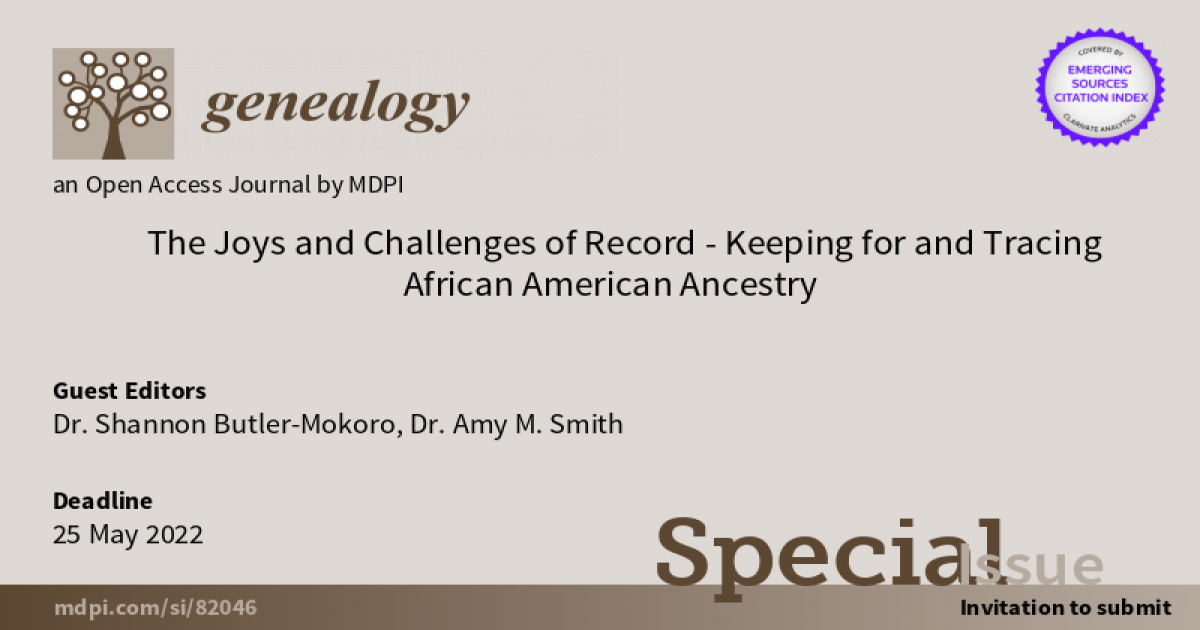- 0.6Impact Factor
- 0.7CiteScore
- 26 daysTime to First Decision
The Joys and Challenges of Record-Keeping for and Tracing African American Ancestry
Special Issue Information
Dear Colleagues,
Tracing our ancestry has always been an important part of our sociocultural and racial and ethnic identities. This process has become a hot topic and trend in the United States. For many African (Black) Americans, this has proven to be a painful challenge. Given that most African Americans are descendants of slaves who were stolen from various countries on the continent of Africa, it is a challenging process to trace one’s ancestral roots. It is especially challenging for people who have been adopted by non-biological relatives and who were part of a closed adoption process.
Tracing our roots and knowing our ancestry is an important aspect of developing our social identities. When we know from where we come, we can celebrate our heritage and share it with others. The written records of African Americans are not readily accessible, though. Often, no accurate records were kept and/or records were destroyed either accidentally—by natural disasters such as fires or floods—or purposefully.
This Special Issue on “The Joys and Challenges of Record-Keeping for and Tracing African American Ancestry” invites contributions of papers, personal narratives, and conceptual pieces related to the keeping of African American family records and/or tracing and researching African American families. Contributions may explore the joys and challenges of keeping African American individual and family histories, searching African American family histories for biological and adoptive families, conducting scholarly research about African American individuals and/or families, and African American adoption histories. Submissions from historians, sociologists, anthropologists, cultural researchers, archivists, and historical librarians and centers are highly encouraged.
Dr. Shannon Butler-Mokoro
Dr. Amy M. Smith
Guest Editors
Manuscript Submission Information
Manuscripts should be submitted online at www.mdpi.com by registering and logging in to this website. Once you are registered, click here to go to the submission form. Manuscripts can be submitted until the deadline. All submissions that pass pre-check are peer-reviewed. Accepted papers will be published continuously in the journal (as soon as accepted) and will be listed together on the special issue website. Research articles, review articles as well as short communications are invited. For planned papers, a title and short abstract (about 250 words) can be sent to the Editorial Office for assessment.
Submitted manuscripts should not have been published previously, nor be under consideration for publication elsewhere (except conference proceedings papers). All manuscripts are thoroughly refereed through a double-blind peer-review process. A guide for authors and other relevant information for submission of manuscripts is available on the Instructions for Authors page. Genealogy is an international peer-reviewed open access quarterly journal published by MDPI.
Please visit the Instructions for Authors page before submitting a manuscript. The Article Processing Charge (APC) for publication in this open access journal is 1400 CHF (Swiss Francs). Submitted papers should be well formatted and use good English. Authors may use MDPI's English editing service prior to publication or during author revisions.
Keywords
- African American family
- African American ancestry
- African American genealogy
- African American adoption
- African American history
- African American databases

Benefits of Publishing in a Special Issue
- Ease of navigation: Grouping papers by topic helps scholars navigate broad scope journals more efficiently.
- Greater discoverability: Special Issues support the reach and impact of scientific research. Articles in Special Issues are more discoverable and cited more frequently.
- Expansion of research network: Special Issues facilitate connections among authors, fostering scientific collaborations.
- External promotion: Articles in Special Issues are often promoted through the journal's social media, increasing their visibility.
- e-Book format: Special Issues with more than 10 articles can be published as dedicated e-books, ensuring wide and rapid dissemination.

